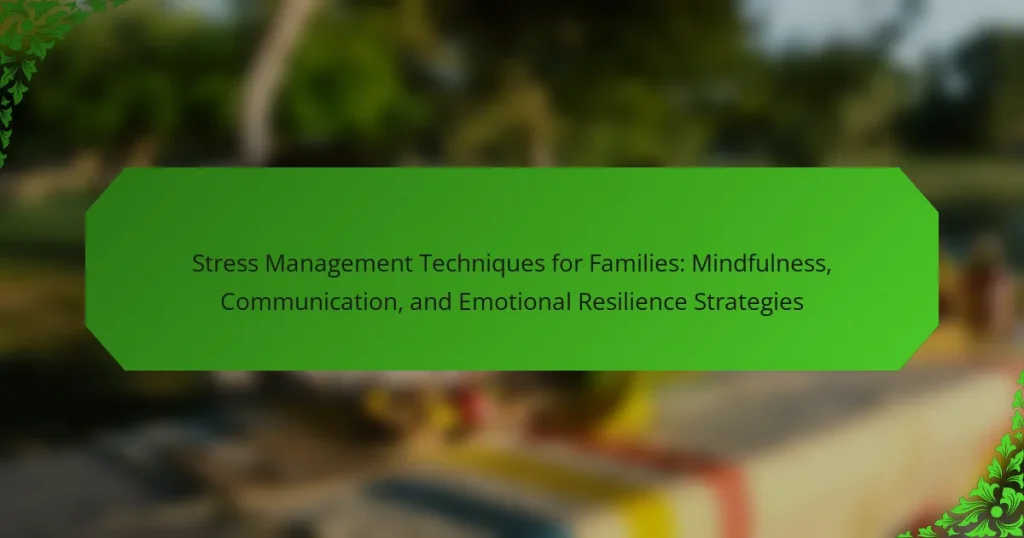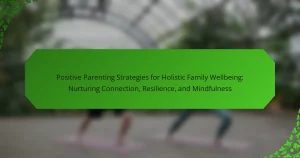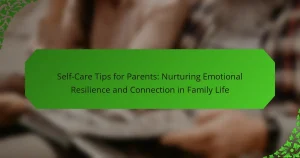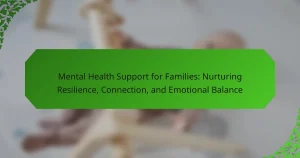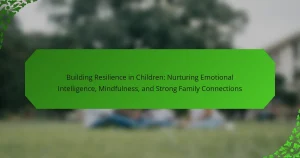Effective stress management techniques for families can significantly enhance emotional resilience and improve communication. Mindfulness practices help reduce anxiety and promote calmness. Regular family meetings facilitate open dialogue, allowing members to share feelings and concerns. Strategies for building emotional resilience equip families to navigate challenges together, fostering a healthier family dynamic.
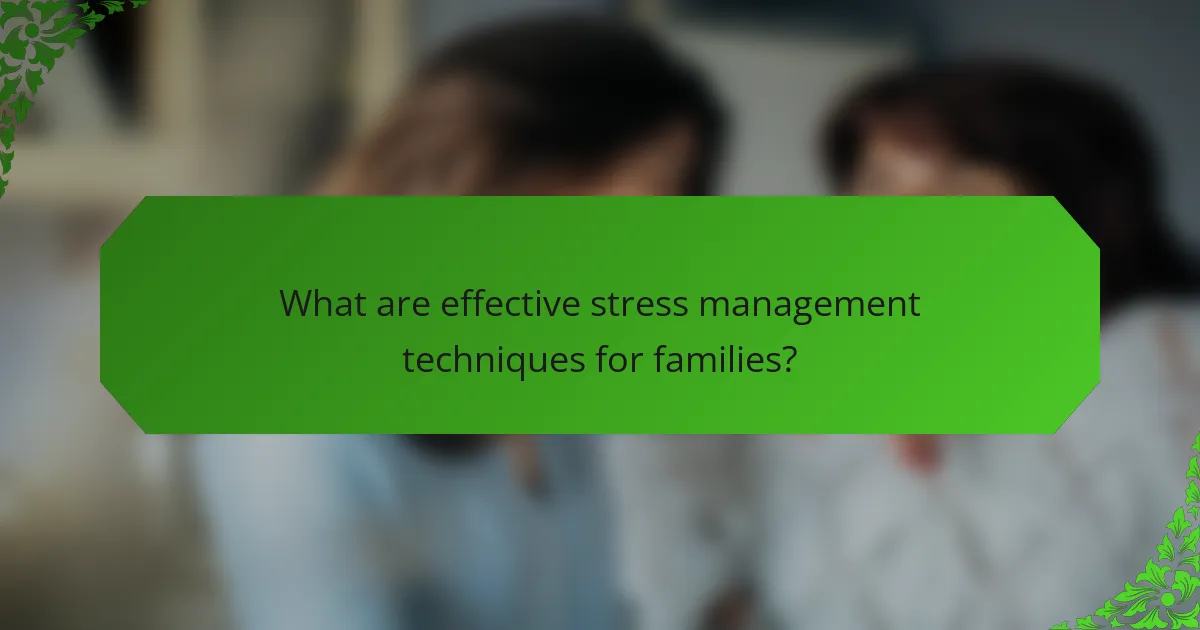
What are effective stress management techniques for families?
Effective stress management techniques for families include mindfulness practices, open communication, and building emotional resilience. Mindfulness helps families stay present, reducing anxiety. Regular family meetings foster communication, allowing members to express feelings and concerns. Emotional resilience strategies, such as problem-solving and coping skills, empower families to navigate challenges together.
How does mindfulness contribute to family stress reduction?
Mindfulness significantly reduces family stress by promoting emotional awareness and enhancing communication. Practicing mindfulness helps family members recognize their feelings, fostering a supportive environment. This technique encourages active listening and empathy, which are crucial for resolving conflicts. Research indicates that families practicing mindfulness experience lower stress levels and improved emotional resilience, leading to healthier relationships.
What are practical mindfulness exercises for families?
Practical mindfulness exercises for families include deep breathing, body scans, and gratitude journaling. These activities enhance emotional resilience and foster communication.
1. Deep Breathing: Families can practice deep breathing together to reduce stress. Inhale deeply for four counts, hold for four, and exhale for four. Repeat several times.
2. Body Scans: Engage in body scans where family members lie down and focus on relaxing each body part. This promotes awareness and relaxation.
3. Gratitude Journaling: Encourage each family member to write down three things they are grateful for daily. This cultivates a positive mindset.
4. Mindful Walking: Take walks together, focusing on the sensations of walking and the surrounding environment. This enhances connection and mindfulness.
How can families incorporate mindfulness into daily routines?
Families can incorporate mindfulness into daily routines by setting aside specific times for practice. This can include morning meditation, mindful eating during meals, or evening reflection sessions. Engaging in these practices fosters emotional resilience, enhances communication, and reduces stress. Mindfulness activities can be adapted for all ages, making them accessible for every family member. For example, children can practice mindfulness through simple breathing exercises or nature walks, while parents can benefit from guided meditation apps. Consistency is key; integrating mindfulness into daily life strengthens family bonds and promotes a supportive environment.
What role does communication play in managing family stress?
Effective communication is crucial in managing family stress as it fosters understanding and emotional support. Open dialogue allows family members to express feelings and concerns, reducing anxiety. Active listening enhances empathy, promoting a supportive environment. Regular family meetings can strengthen connections and address issues before they escalate. Additionally, using “I” statements can prevent defensiveness, encouraging constructive conversations. Ultimately, strong communication skills build emotional resilience, enabling families to navigate stress more effectively.
How can families improve their communication skills?
Families can improve their communication skills by practicing active listening, expressing feelings openly, and engaging in regular family discussions. These techniques foster understanding and emotional connection.
Active listening involves fully concentrating on what others are saying, which enhances empathy and reduces misunderstandings. Expressing feelings openly allows family members to share their thoughts without fear of judgment, promoting a safe space for communication. Regular family discussions, whether during meals or dedicated family meetings, create opportunities for everyone to voice their opinions and concerns, strengthening relationships.
Incorporating mindfulness practices can further enhance communication. Mindfulness encourages family members to be present and attentive, reducing stress and facilitating clearer conversations. As a result, families can build emotional resilience, leading to healthier interactions and improved conflict resolution.
What are common communication barriers in families?
Common communication barriers in families include stress, lack of active listening, and emotional misunderstandings. Stress can create tension, leading to misinterpretation of messages. Lack of active listening prevents family members from fully understanding each other. Emotional misunderstandings arise when feelings are not expressed clearly, resulting in conflict. Addressing these barriers is essential for effective communication and emotional resilience.
What strategies enhance emotional resilience in family members?
Practicing mindfulness, enhancing communication, and fostering emotional awareness are effective strategies to enhance emotional resilience in family members. Mindfulness techniques, such as meditation and deep breathing, help individuals manage stress and increase emotional awareness. Open communication fosters trust and understanding, allowing family members to express their feelings and resolve conflicts. Additionally, encouraging emotional expression and validating feelings strengthens connections and builds resilience.
How can families build emotional resilience together?
Families can build emotional resilience together through mindfulness practices, open communication, and supportive strategies. Engaging in mindfulness activities, such as meditation or deep breathing, fosters awareness and reduces stress. Establishing effective communication allows family members to express feelings and concerns, strengthening bonds. Implementing resilience strategies, like problem-solving together, helps families navigate challenges. Research shows that families who practice these techniques report higher emotional well-being and improved relationships.
What are the signs of emotional resilience in children?
Signs of emotional resilience in children include adaptability, problem-solving skills, and a positive outlook. These traits enable children to cope effectively with stress and setbacks. For instance, resilient children often demonstrate emotional awareness, showing an ability to express their feelings appropriately. They also seek support from peers or adults when needed, indicating strong communication skills. Additionally, they exhibit perseverance, working through challenges rather than avoiding them. Overall, these attributes contribute to a child’s ability to manage stress and build emotional strength.
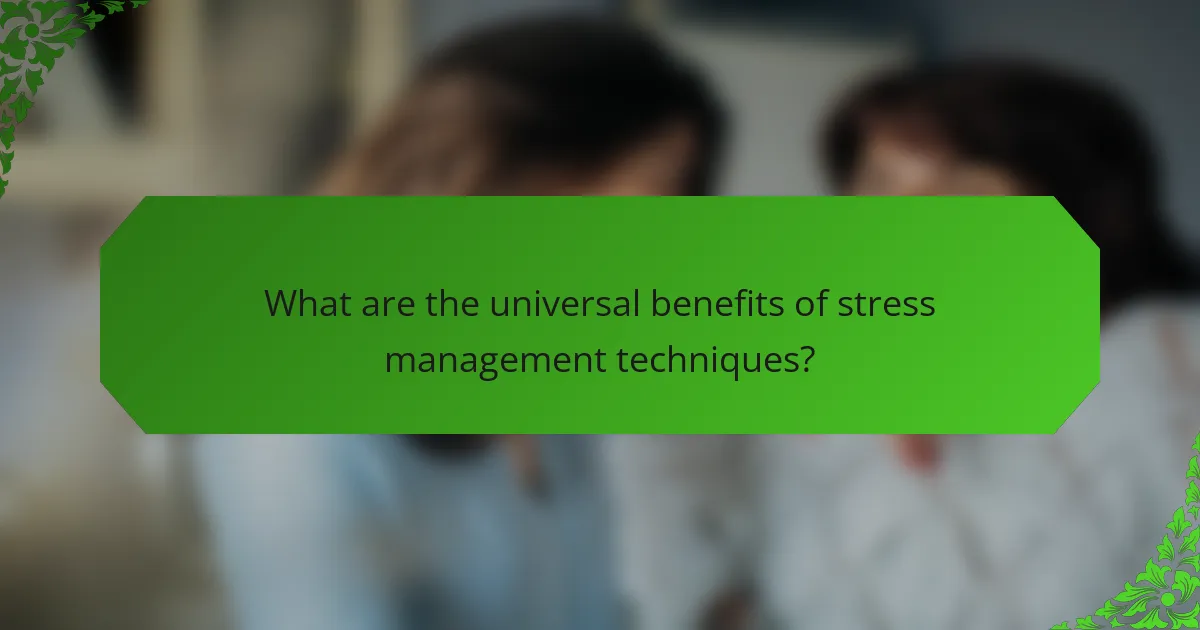
What are the universal benefits of stress management techniques?
Stress management techniques provide families with essential tools to enhance emotional resilience, improve communication, and foster mindfulness. These benefits include reduced anxiety, improved relationships, and better overall mental health. Research indicates that families practicing mindfulness techniques experience a 30% decrease in stress levels. Effective communication strategies promote understanding and support, leading to stronger family bonds. Emotional resilience techniques empower family members to cope with challenges, enhancing their ability to navigate life’s stresses. Together, these techniques create a healthier family dynamic, promoting well-being and harmony.
How do these techniques improve family relationships?
Stress management techniques improve family relationships by fostering better communication, enhancing emotional resilience, and promoting mindfulness. These strategies create a supportive environment where family members feel understood and valued. For example, practicing mindfulness together can reduce anxiety and encourage positive interactions. Enhanced communication leads to resolving conflicts more effectively, strengthening bonds. Emotional resilience training equips families to navigate challenges collaboratively, reinforcing trust and connection. Overall, these techniques cultivate a harmonious family dynamic, promoting well-being and unity.
What unique approaches can families take to stress management?
Families can adopt unique approaches to stress management by integrating mindfulness practices, enhancing communication, and building emotional resilience. Mindfulness techniques, such as meditation and deep breathing, help create a calm environment. Open communication fosters understanding and support among family members. Additionally, emotional resilience strategies, like problem-solving together and practicing gratitude, strengthen family bonds and improve coping mechanisms. These methods empower families to navigate stress effectively and maintain a harmonious atmosphere.
What are culturally specific stress management practices?
Culturally specific stress management practices often include community support, traditional healing methods, and family rituals. These practices enhance emotional resilience and promote mindfulness through shared experiences. For example, Indigenous cultures may utilize storytelling as a means of processing stress, while Asian cultures often emphasize collective harmony and open communication. Understanding these unique attributes can improve family dynamics and stress relief strategies.

What are the rare but impactful stress management strategies?
Mindfulness practices, open communication, and building emotional resilience are rare but impactful stress management strategies for families. These techniques foster a supportive environment, enhancing overall well-being. Mindfulness encourages present-moment awareness, reducing anxiety and promoting calmness. Open communication strengthens family bonds, allowing members to express feelings and concerns effectively. Emotional resilience equips families to navigate challenges, fostering adaptability and a positive outlook. Implementing these strategies can transform family dynamics and significantly alleviate stress.
How can art and creativity aid in family stress relief?
Art and creativity significantly alleviate family stress by fostering emotional expression and connection. Engaging in creative activities such as painting or music can enhance communication and strengthen family bonds. Research shows that creative expression reduces anxiety levels and promotes mindfulness, allowing families to navigate stressors more effectively. Additionally, shared artistic experiences cultivate emotional resilience, enabling families to face challenges together.
What creative activities can families engage in together?
Families can engage in creative activities like arts and crafts, cooking together, or storytelling. These activities enhance mindfulness, improve communication, and foster emotional resilience. Arts and crafts allow families to express feelings visually, while cooking encourages teamwork. Storytelling nurtures emotional connections and sharing experiences. Engaging in these activities regularly can significantly reduce stress and strengthen family bonds.
What are the best practices for implementing stress management techniques?
To effectively implement stress management techniques for families, focus on mindfulness, communication, and emotional resilience. Start with mindfulness practices, such as deep breathing or meditation, to enhance awareness and reduce anxiety. Foster open communication among family members to express feelings and concerns, which strengthens relationships. Finally, build emotional resilience by encouraging problem-solving skills and adaptability in stressful situations. These strategies create a supportive environment that promotes overall well-being.
What common mistakes should families avoid in stress management?
Families should avoid common mistakes like neglecting open communication, failing to practice mindfulness, and overlooking emotional support. These errors can exacerbate stress and hinder effective management. Emphasizing active listening, setting aside time for family discussions, and incorporating mindfulness practices can enhance resilience. Recognizing each family member’s feelings fosters a supportive environment, which is crucial for managing stress collectively.
How can families evaluate the effectiveness of their stress management strategies?
Families can evaluate the effectiveness of their stress management strategies through regular assessments and open discussions. Tracking emotional responses and stress levels over time provides insight into what works.
Engaging in mindfulness practices can enhance awareness of stress triggers and coping mechanisms. Families can implement communication sessions to share experiences and feelings, fostering emotional resilience.
Setting specific goals for stress management and reviewing them periodically helps in measuring progress. Additionally, seeking feedback from all family members ensures that everyone feels heard and valued in the process.
By combining these approaches, families can create a supportive environment that promotes effective stress management and overall well-being.
